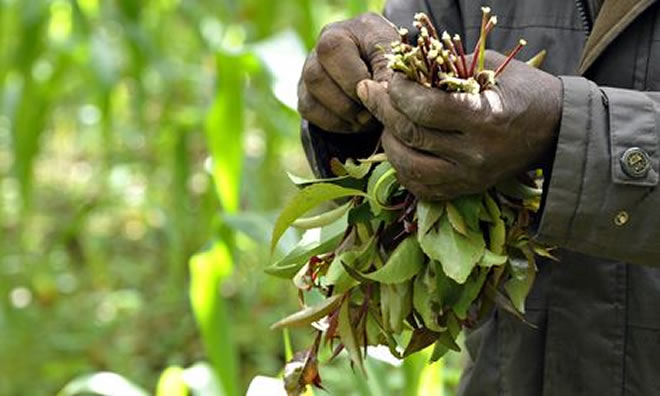Khat is as potent as a strong cup of coffee and has no organised crime involvement – yet the government wants to spend £150m on a ban that would create far more severe problems

Julian Huppert
Monday, March 31, 2014

Khat from a 300-year-old tree on a farm in Meru, central Kenya, where life revolves around the cultivation of the plant. Photograph: Simon Maina/AFP/Getty Images
Drugs, including alcohol and tobacco, are of course harmful, whatever their legal status, and our aim should be to reduce the harm caused. I've argued strongly for reform, and an end to the failed war on drugs. I think the general opinion in the UK is heading that way, albeit slowly.
There is a specific decision to be made right now, however, about a substance called khat. This is a leaf traditionally chewed by people from the Horn of Africa. In the UK, communities from that area still chew it, particularly Somalis, but also Ethiopians, Kenyans and Yemenis among others. It's a mild stimulant – roughly on a par with a strong cup of coffee. It is not considered particularly addictive, and there's no clear evidence that it causes either physical or social harms. It is imported perfectly legally, and taxes are paid on it, to the tune of £12.8m each year.
When the Advisory Council on the Misuse of Drugs, the government's expert advisors, were asked to consider khat, they said that it would be "inappropriate and disproportionate" to ban it. The cross-party home affairs select committee, on which I serve, produced a unanimous report opposing a ban.
And yet the home secretary plans to do it anyway. On Monday, MPs will be asked to make it a criminal offence to sell, buy, or chew khat.
The home secretary claims that banning khat will improve people's lives, as they would stop chewing it. However, experience shows that making these substances illegal doesn't stop people consuming them – it just drives the trade underground. Look at prohibition in the US, or cannabis in the UK. Banning things simply doesn't work.
And even if it did, it is most likely to push people to take other drugs – probably tobacco and alcohol, both of which are more dangerous. When Somalis living in London were surveyed, 90% agreed they would rather their children used khat than alcohol, and 77% would prefer they use khat than cigarettes.
There is no gang or organised crime currently associated with khat use. When criminalised in other countries, organised crime has, for obvious reasons, stepped in to provide the supply; there's no evidence that demand reduces. In addition, we would be asking the police to enforce a ban that only affects specific ethnic groups – hardly a recipe for good race relations.
We should also consider the effect of a ban on the area where khat is grown: Meru province in Kenya. I, together with Keith Vaz, chair of the home affairs select committee, met a delegation of Kenyan parliamentarians, who were very alarmed by the prospect of a ban in the UK. A huge amount of employment in that province rests on khat production, and if we simply block sales, many farmers will lose their livelihoods – in a key area vulnerable to recruitment by the militant Islamist group al-Shabaab.
So a ban is unlikely to help people, but will create an opportunity for organised crime groups to make large profits, as well as promoting terrorist recruitment in Kenya. Moreover, the ban would cost the UK taxpayer a huge amount of money – the government estimates a total net cost of £150m. Not a great deal.
I and my fellow Lib Dem on the committee, Greg Mulholland, will oppose this ban. The rest of the committee consists of eight Tories, all of whom will be whipped to support it, Jim Shannon of the Democratic Unionist party and seven Labour MPs, who have yet to state a position.
If any of them believe in evidence-based drugs policy, and want to take a decision that will save money and prevent organised crime, I hope they will join us and stop this disproportionate, expensive and damaging ban.